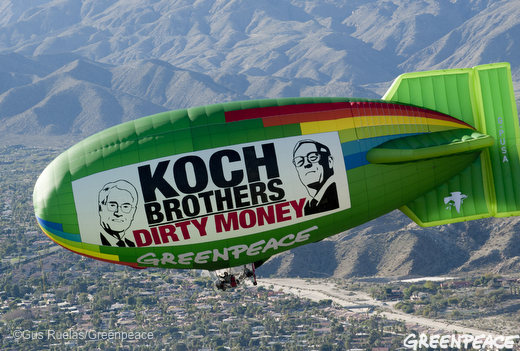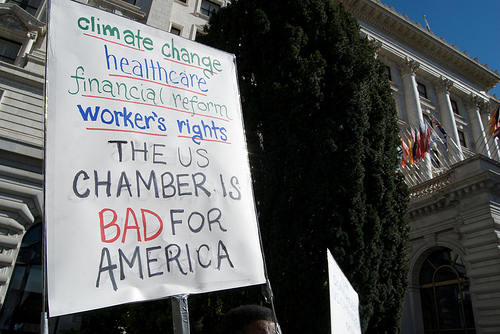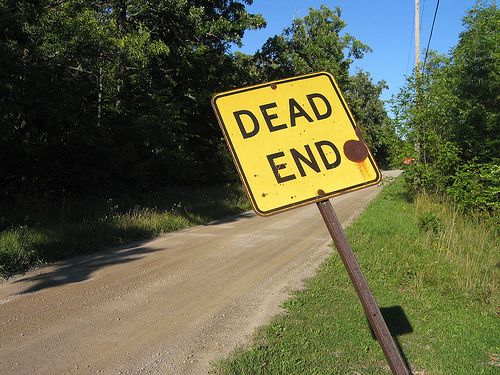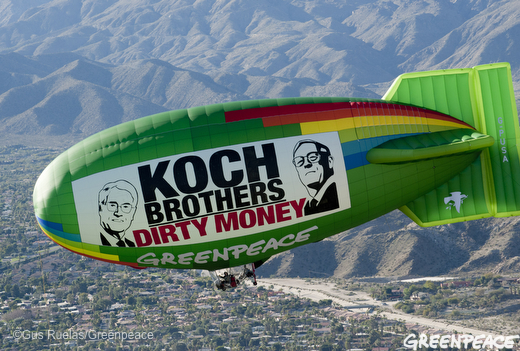 The Greenpeace airship spreads the word.Photo: Gus Ruelas/GreenpeaceAmong other truths made completely clear by the showdown in Wisconsin: the outsized role of the Koch brothers in American politics.
The Greenpeace airship spreads the word.Photo: Gus Ruelas/GreenpeaceAmong other truths made completely clear by the showdown in Wisconsin: the outsized role of the Koch brothers in American politics.
Charles and David, the third and fourth richest men in America, first gained notoriety this past fall, when a remarkable exposé by Jane Mayer in The New Yorker showed how they’d funded not only the Tea Party but also the hydra-headed campaign to undermine the science of global warming, all in the service of even more profit for their oil and gas business.
But it was in Wisconsin that the down-and-dirty details of their operation began to emerge. They’d not only funded the election campaigns of the governor and the new GOP legislature, but also an advertising effort attacking the state’s teachers. They’d helped pay for buses to ferry in counter-protesters. We were even treated to the sight of new Gov. Scott Walker (R) fawning over them in what turned out to be a hoax phone call.
The Kochs are right up there now with the great plutocrats of American history, a 21st-century version of the robber barons. And they don’t care. They don’t have to care. Their business is privately held and answers to no one. Last week, their spokesman said they would “not step back at all … This is a big part of our life’s work. We are not going to stop.” So those of us who care about things like the climate will need to go on tracking them. But we’ll also need to pay attention to their ideological twin, the Pepsi to their Koch. It’s the U.S. Chamber of Commerce.
Unlike the Koch brothers, everyone’s heard of the Chamber of Commerce. That’s because there’s a local chamber in almost every town in America — they’re the neighborhood barbers and florists and insurance guys, the folks who arrange the annual chili cook-off or the downtown Christmas lights. You know why Lindbergh’s plane was called the “Spirit of St. Louis”? Because it was paid for by the by St. Louis Chamber of Commerce.
But that’s not the U.S. Chamber of Commerce. The U.S. Chamber is a hard-right ideological operation that provides massive funding to conservative Republicans, including the new GOP majority in Wisconsin. For a sense of just how far right, consider that Glenn Beck held a telethon on its behalf and donated $10,000 of his own money. “They are us,” he said — and an executive of the chamber called in to thank him. The U.S. Chamber of Commerce spent more money lobbying in 2009 than the next five biggest players combined; it spent more money on politics than either the Republican or Democratic National Committees. It’s the biggest elephant in the jungle.
 Sign language.Photo: Steve RhodesDespite its claim to represent 3 million American businesses, more than half of the chamber’s budget comes from just 16 companies. The group doesn’t have to identify them, but it’s pretty easy to guess who they might be, since the chamber has devoted much of its time to thwarting any effort to control carbon emissions. For instance, it filed a brief with the EPA demanding that the agency not fight global warming because “populations can acclimatize to warmer climates via a range of behavioral, physiological, and technological adaptations.”
Sign language.Photo: Steve RhodesDespite its claim to represent 3 million American businesses, more than half of the chamber’s budget comes from just 16 companies. The group doesn’t have to identify them, but it’s pretty easy to guess who they might be, since the chamber has devoted much of its time to thwarting any effort to control carbon emissions. For instance, it filed a brief with the EPA demanding that the agency not fight global warming because “populations can acclimatize to warmer climates via a range of behavioral, physiological, and technological adaptations.”
But unlike the Kochs, the chamber has some real vulnerabilities. Though thanks to the Supreme Court it can keep its secret flow of money going, its credibility depends in part on the idea that it’s representing all those millions of businesses. That’s why we at 350.org have launched a big nationwide campaign: “The U.S. Chamber Doesn’t Speak for Me.” Businesses big and small are already joining in — a thousand in the first week — making the case that in fact capitalism can adapt to new sources of energy. Capitalism’s great virtue, after all, is supposed to be nimbleness and flexibility.
Those of us who work on climate change have spent years trying to figure out why Congress pays no attention to what’s clearly the most dangerous issue facing the planet. For years we thought we simply needed to explain the crisis more skillfully. But over the last year, the truth has become more clear: Hidden in the shadows are the guys with money who pull the strings. We need to illuminate those shadows, with the Kochs and even more with the U.S. Chamber.
Originally published at GreenBiz.com.



